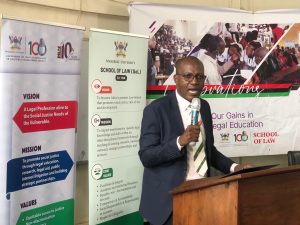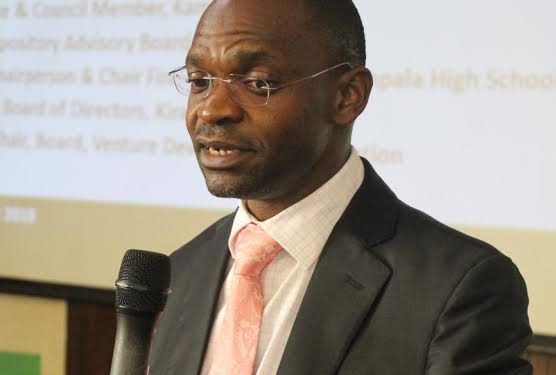Makerere University has called for the infusion of the Public Interest Law Clinic (PILAC) Model of transformative education into the post-graduate courses at the school of law.
Speaking at the event to mark PILAC’s 10 years of service, the Deputy Vice-Chancellor of Academic Affairs, Umar Kakumba, said what PILAC has offered the students and the communities through the community programmes is transformative education, noting that the 600 or so students that have had the opportunity to engage in the PILAC programmes are not lawyers by the letter of law, but lawyers at heart who are out there transforming lives with a social justice consciousness.
“I challenge PILAC: in 2032, when we return to celebrate PILAC@20, can we have stories of the transformative education in the post-graduate courses here at the School of Law,” he mused.
“The big question for your consideration is how the clinical model can be infused into the LLM program and another post-graduate initiative here at the School of Law.”
He described the request as a Doctoral Assignment for the academia at the School of Law and in the other Universities teaching Law.
Kakumba told guests that what began as finding innovative ways of teaching law through ‘Clinical Legal Methods’, grew to include a community outreach programme that has given the School of Law and Makerere University relevance out there.
“Before 2012, the concept of pedagogy in the teaching of law was rarely talked about here. I am told that it was all about the ‘cage in the library’, ‘Acts of Parliament, ‘court decisions’ and ‘law reports’. All you needed then was to land yourself on the written text and listen in to the lecturer,” he said.
He added: “The PILAC Model” of legal aid provision in the legal aid circles, where law students are capacitated and given a platform to reach out to communities in need of legal aid services, was born. I know that PILAC has gone ahead to scale up the model to other universities to also consider clinical methods of instructing law and the use of student resources to reach vulnerable communities. We at Makerere celebrate the East African Network of University Law clinics an initiative of PILAC to scale up the PILAC Model. As we celebrate the 10 years we can confidently say that indeed PILAC has offered transformative education.”

In his remarks, the outgoing Principal School of Law and Coordinator of PILAC, Professor Christopher Mbazira, said they have changed the way lawyers are trained by ensuring that they are infused with elements of social justice, human rights, rule of law, and access to justice in the teaching of law students.
“The effect of our services have been immense, first of all, we have impacted legal education because we have changed the way lawyers are trained by ensuring that we infuse elements of social justice, human rights, rule of law, and access to justice in the teaching of law students so that by the time they graduate, they are alive to the needs of the community, especially the vulnerable sections of society,” he said.
“We have also impacted the community by providing legal aid services, legal representation, and legal counselling which we have done quite efficiently in the communities where we have worked.”
However, he said, PILAC is currently faced with funding challenges since some of their key financiers like the Democratic Governance Facility (DGF) are closing up operations.
He called on those who have benefited from the model to help support the initiative financially.
At the same event, PILAC launched the PILAC@10 Book and awarded some of its partners and guest speakers.
Established in January 2012, PILAC was the first legal aid Clinic to be launched at a University in Uganda to promote hands-on experiential learning as well as expose students to ‘live’ cases of individuals who have been confronted by the law in its varied manifestations.









